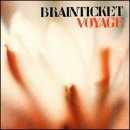Brainticket: Voyage (1982)
 After Brainticket released Celestial Ocean in 1973, they seemed to have vanished for a number of years, until 1980, when they gave us Adventure. By that time, the band became an all-instrumental outfit, with Joël Vandroogenbroeck, as always, handling the keyboards and flute, percussionist Barney Palm, whose been with the band since 1972’s Psychonaut, and two keyboardists, Hans Deyssenroth, and Wilhelm Seefeldt.
After Brainticket released Celestial Ocean in 1973, they seemed to have vanished for a number of years, until 1980, when they gave us Adventure. By that time, the band became an all-instrumental outfit, with Joël Vandroogenbroeck, as always, handling the keyboards and flute, percussionist Barney Palm, whose been with the band since 1972’s Psychonaut, and two keyboardists, Hans Deyssenroth, and Wilhelm Seefeldt.
This very same lineup followed up Adventure with Voyage two years later, but I am very certain that the album was actually recorded in 1976, four years before Adventure (the liner notes say that Voyage was recorded February 6th, no year, and of course, it also stated who was in the band at the time). The reason why I believe Voyage was recorded in ’76 is the music sounds VERY mid ’70s.
All keyboards used were common to the 1976 time period: Mini Moog, clavinet, Fender Rhodes electric piano, RMI Keyboard Computer, EMS Synthi A, and no keyboards common to the 1982 time period like the Prophet 5 or the Oberheim OBX. Anyway, this album consists of only two side length cuts, divided by Part 1 and Part 2 and it’s an incredible blend of improvised electronics, Balinesian gamelan, jazz, and just plain experimental weirdness.
This version of Brainticket featured no one on guitar, bass, drums, or even a vocalist, for that matter. It’s all centered around the keyboards, and lots of odd, exotic percussion, like tabla, thunder sheets, and the aforementioned gamelan, as well as a little bit of flute.
The album starts off with some strange, electronic, circus like music, before the band starts playing gamelan. After that, then the electric piano, clavinet, and synthesizers kick in, and it sounds very 1970s. Then it gets really strange with the electronic effects, sounding like Tangerine Dream or Amon Düül II, before Part 1 ends with the same strange electronic circus music it started with. Part 2 stars with several minutes of bizarre noodling on synthesizers and thundersheets, before the music calms down and the flute comes in. Then there’s several minutes of Moog soloing that sounds like something Jan Hammer might do (I wouldn’t be surprised if Brainticket heard Jan Hammer’s The First Seven Days before recording this album). Then the album ends with the sound of electronically modified flute, and strange sounds that are hard to describe. All I can say is this whole album makes me think of mid 1970s TV and movie documentaries (i.e. In Search Of… With Leonard Nimoy, Overlords of the UFO, Mysteries From Beyond Earth) as the music would fit perfect to such movies and TV programs of the time. I often imagine ’70s grainy footage when I hear Voyage.
This is one killer album, especially for those who love the sounds of vintage synthesizers. And that’s not all: the 1997 Purple Pyramid CD reissue includes three bonus cuts. One is “Skyline (Analog 1970)”, not really recorded in 1970, but around the same time as Voyage (synthesizers and percussion dominate and has that same mid ’70s sound. If it was actually recorded in 1970, it would sound like Cottonwoodhill outtakes, which it doesn’t).
This is such an incredible piece, I am just completely blown away by this. Hearing this it becomes really depressing to think people listen to Britney Spears and the Backstreet Boys these days, especially when there was music like what Brainticket was doing back in the 1970s.
The other two bonus cuts, “Underworld Paths” and “Nebula” sound like they were recorded around the mid 1980s, maybe 1985, as unsurprisingly, the digital synthesizers dominate these pieces, but done surprisingly well. “Nebula” totally blows me away because it’s mainly spacy ambience. I have no idea where these bonus cuts came from, but I’m glad they were included on this reissue.
I find Voyage to be a rather underrated album, as this album, as well as Adventure, gets frequently criticized as being little else than “electronic noodling”, but I can’t agree on that, since Voyage is an incredible album, and if the description sounds of this album sounds good to you, get this.
